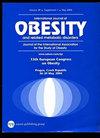Childhood maltreatment, adulthood obesity and incident type 2 diabetes: a retrospective cohort study using UK Biobank
IF 4.2
2区 医学
Q1 ENDOCRINOLOGY & METABOLISM
引用次数: 0
Abstract
This study aims to explore the association of childhood maltreatment with obesity and type 2 diabetes (T2D) in adulthood, and whether obesity is a mediator of the latter. In a retrospective cohort study using UK Biobank data, participants recalled childhood maltreatment. Linear regression, logistic regression, and Cox proportional hazard models were used to investigate the associations with body mass index (BMI), obesity, and T2D, adjusted for sociodemographic factors. Decomposition analysis was used to examine the extent to which T2D excess risk was attributed to BMI. Of the 153,601 participants who completed the childhood maltreatment questions, one-third reported some form of maltreatment. Prevalence of adult obesity and incidence of T2D were higher with the number of reported childhood maltreatment types. People who reported ≥3 types of childhood maltreatment were at higher risk of obesity (OR 1.55, 95% CI 1.47–1.63) and incident T2D (HR 1.65, 95% CI 1.52–1.80). Excess T2D risk among those reporting maltreatment could be reduced by 39% if their BMI was comparable to participants who had not been maltreated, assuming causality. People who recalled maltreatment in childhood are at higher risk of T2D in adulthood, partly due to obesity.童年虐待、成年肥胖和 2 型糖尿病:利用英国生物数据库进行的回顾性队列研究。
研究背景本研究旨在探讨童年虐待与成年后肥胖和2型糖尿病(T2D)之间的关系,以及肥胖是否是后者的中介因素:在一项利用英国生物库数据进行的回顾性队列研究中,参与者回忆了童年时期遭受虐待的情况。采用线性回归、逻辑回归和 Cox 比例危险模型来研究与体重指数 (BMI)、肥胖和 T2D 的关系,并对社会人口因素进行调整。采用分解分析法研究了体质指数对终末期糖尿病超额风险的影响程度:在 153,601 名填写了儿童虐待问题的参与者中,有三分之一报告了某种形式的虐待。报告的童年虐待类型越多,成人肥胖率和T2D发病率越高。报告遭受过≥3种童年虐待的人患肥胖症(OR 1.55,95% CI 1.47-1.63)和T2D(HR 1.65,95% CI 1.52-1.80)的风险较高。假设存在因果关系,如果受虐待者的体重指数(BMI)与未受虐待者相当,那么报告受虐待者患T2D的风险可降低39%:结论:忆及童年受虐待的人成年后患 T2D 的风险较高,部分原因是肥胖。
本文章由计算机程序翻译,如有差异,请以英文原文为准。
求助全文
约1分钟内获得全文
求助全文
来源期刊

International Journal of Obesity
医学-内分泌学与代谢
CiteScore
10.00
自引率
2.00%
发文量
221
审稿时长
3 months
期刊介绍:
The International Journal of Obesity is a multi-disciplinary forum for research describing basic, clinical and applied studies in biochemistry, physiology, genetics and nutrition, molecular, metabolic, psychological and epidemiological aspects of obesity and related disorders.
We publish a range of content types including original research articles, technical reports, reviews, correspondence and brief communications that elaborate on significant advances in the field and cover topical issues.
 求助内容:
求助内容: 应助结果提醒方式:
应助结果提醒方式:


